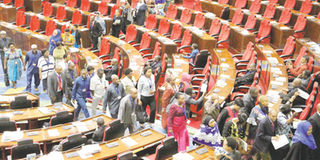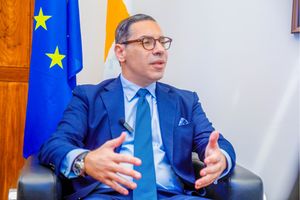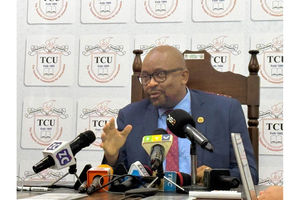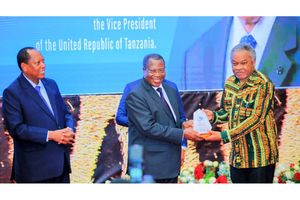Is Opposition’s stance against deputy speaker totally justified?

Opposition MPs walk out of Parliament debating chamber in protest against Deputy Speaker Tulia Ackson’s modus operandi.
What you need to know:
- It started when the deputy speaker turned down a private motion by Mr Juma Nkamia (Chemba-CCM) who wanted the Parliament to shelve ongoing debate on water ministry budget and debate the government decision to kick out students from University of Dodoma who were pursuing a special teaching programme.
Dar es Salaam. It is more than two weeks now the opposition has been maintaining their stance to boycott all parliamentary sessions, being formal meetings or even workshops, chaired by Deputy Speaker, Dr Tulia Ackson. This stand results from their conviction that Dr Ackson is treating them unfairly.
It started when the deputy speaker turned down a private motion by Mr Juma Nkamia (Chemba-CCM) who wanted the Parliament to shelve ongoing debate on water ministry budget and debate the government decision to kick out students from University of Dodoma who were pursuing a special teaching programme.
After Dr Ackson turned down this motion, Joshua Nassari (Arumeru east-Chadema) rose and made the same application. As expected, Dr Ackson turned it down as well and the decision incensed the opposition members who started to shout and boo.
The Deputy Speaker ordered law enforcers to forcefully remove the opposition MPs and shortly afterwards adjourned the session and called the Steering Committee meeting.
But this was only one factor. Dr Ackson’s fallout with the opposition started when she was first nominated a Member of Parliament by President Dr John Magufuli, and a few days later elected Deputy Speaker.
Her nomination was criticised on grounds that a person who was serving as a civil servant was not fit to become a leader of an independent pillar of governance like Parliament. The opposition viewed her nomination as government plans to control the Parliament and they maintain this claim todate.
The opposition sentiments were ‘informed’ by the ‘role’ which Dr Ackson played when serving as a member of the Constituent Assembly, which was boycotted by the opposition in its later stages.
So, even when Dr Ackson presided over a session in which seven opposition MPs were banned from attending parliamentary meetings, she was seen as being behind that penalty though it was issued by the Parliamentary Committee for incident which occurred in January, in a session chaired by Mr John Chenge.
Opposition MPs regard Dr Ackson as a person in a special mission to ensure that they don’t use their freedom and space in the House to harmer the government. They associate her actions and inactions to what they believe as special duty to safeguard the government and ruling Chama Cha Mapinduzi (CCM).
Vote of no confidence
The opposition, through Simanjiro MP, James Millya (Chadema), has already lodged a petition to ask the Parliament to cast a vote of no confidence on the Deputy Speaker for her alleged failure to observe fairness. Among other things, they accuse Dr Ackson of showing biasness towards the ruling CCM.
Despite those claims, the Clerk of the National Assembly, Dr Thomas Kashillilah, has not seen anything wrong on how the Deputy Speaker manages her position.
However, some political analysts have expressed mixed opinions. While others say they have not noted any difference on how the tenth and 11th Parliaments operates, there are others who think the current law making organ was weak min safeguarding national interests.
But there is another group which blames the Parliament Standing Orders. They note that all which has been witnessed so far, was a result of the standing orders.
The Legal and Human Rights Centre (LHRC) Director, Dr Helen Kijo Bisimba, criticises the decision to suspend some MPs after they demanded for the Bunge sessions to be broadcast live as tantamount to denying Tanzanians the right to hear, see and monitor how those they have elected to present them in Parliament.
“The MPs have been elected by people and their demand for live Bunge coverage is based on the interests of members of the public. The Deputy Speaker decides to expel them from Parliament because she wants to protect the government. This is not fair. People need to stand firm to ensure their MPs continue with their duties they were sent for,” the LHRC Director says.
Dr Bisimba has called upon the Deputy Speaker and the Bunge Chairperson to make a decision based on the country’s regulations and Constitution without favour with the aim of protecting the interests of the nation as well as Tanzanians.
Prof Mohammed Bakari from the Department of Political Science and Good Governance at the University of Dar es Salaam (UDSM) says fierce debates is a norm in any Parliament if it is to be seen as active. But, he says most of time the debates in the Parliament are dominated by emotions. Political affiliations affect reasoning and arguing capabilities of many MPs. There are very few MPs who debate things on their merit, basing on the national interests.
“Because many debate issues emotionally, it is very difficult for them to make sensible decisions. Many issues are not given the weight they deserve in discussion simply because MPs have decided to see them through political lens and not on their merit. That is why sometimes people might see the tenth Parliament as being competent than this one,” he says adding:
“To make the things worse, most of time majority CCM MPs rely on their number when it comes to making decisions. We have witnessed that in most cases they put government and party interests infront of national and people interests.”
Regulations weakness
Though Mr Millya has presented his petition against the Deputy Speaker, it is unlikely that the petition will succeed. This is because the opposition will not be able to meet some of conditions set out in the regulations.
According to section 138 of the Standing orders requires such petition to be supported by not less than two thirds of MPs for the Deputy Speaker to be removed. Given the Parliament composition currently, opposition will not be able to bet that number of signatures to unseat Dr Ackson.
Civil and Political Right Watch (CPW) Director, Mr Marcossy Albanie, says in the Tenth Parliament under Speaker Anna Makinda and her deputy, Job Ndugai, 11 petitions seeking to censure parliament leaders were presented but until the Parliament wound its activities, none of them was ever discussed.
Mr Albanie, who contested for the Morogoro Urban Parliamentary Seat through Chadema, says such kind of weakness is a result of Bunge move to protect its leaders through regulations. “If a motion presented to the committee is for removing Speaker, then the Deputy Speaker becomes the chairperson of the committee or if such a motion is for removing the Deputy Speaker, then Speaker becomes the chairperson of the committee. It is just like having a monkey to preside over a case involving a baboon,” he says.
What many people have not fathomed is the fact that Parliament is a political body. Its members are politicians just like its leaders. A god example to allude to this theory is what happened to former Speaker, Mr Samuel Sitta. When he wanted to contest for the position for the second term in 2010, his party, CCM axed his name on grounds that it was a turn for a woman to lead the law making organ.
Ms Anne Makinda was picked in his place and that was the beginning of the end of Mr Sitta’s political career. After serving as an MP for the last five years, Mr Sitta flopped in his bid to clinch his party presidential nomination and today he is among many politicians whose fame has started to fade.
Many people believe that all this happened to Mr Sitta given his stand on some issues. He distinguished himself as among people who have decided to serious wage war on grand corruption. Basing on that stand, Mr Sitta allowed a number of debates in the parliament which shamed the government.
It was under Mr Sitta’s Bunge leadership that a select committee lead by Kyela MP, Dr Harrison Mwakyembe was formed to probe the Richmond scandal. It is Richmond report which saw the resignation of former Premier, Mr Edward Lowasa, forcing the then President Jakaya Kikwete to reconstitute his government.
Some people who have assessed the current Parliament believe that it has deviated from what Mr Sitta aspired for. Lindi Secondary School teacher, Mr Moshi Mambo, says the current Speaker, Mr Job Ndugai, has tried his level best to supress issues which would corner the government.
“Ndugai knows MPs very well including how they practice politics. He has been careful on how he handles them. But, may be what he doesn’t know is that he can leave behind a good legacy if he will listen to the Opposition. But he should also not allow MPs to earn themselves political popularity through Bunge,” he says.
TGNP human rights activist Gemma Akilimali supported Mambo noting that the Mr Ndugai’s wisdom can control emotions from the MPs during Bunge debates.
Bunge’s Propaganda
Former NCCR-Mageuzi secretary general, Mr Samweli Ruhuza, defends the political fanaticism in the Parliament noting that is one of places where political parties ideology differences should be put to test.
“It is true that MPs have been elected by people but we should also not forget that for one to get a chance to be elected by the people he needs backing of a political party. So, while an MP serves the people he is also supposed to save his party,” he elaborates. He noted further that at the same time, an MP should also work to build his personal reputation because most of them want to be re-elected.
For more news get your copy of The Citizen read online through www.epaper.mcl.co.tz



